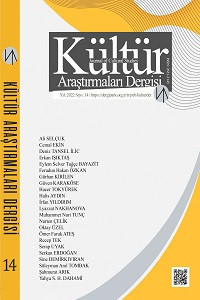Kimlik Arayışındaki Modern İnsan: Şövalyeler Birliğinden Mr Stone
Bu makale V. S. Naipaul’un memleketi olan Trinidad deneyimlerinden yola çıkarak kaleme almadığı ilk roman olarak önemli bir yere sahip Mr Stone and The Knights Companion adlı romanı ele almıştır. Roman her ne kadar yazarın daha önceden kaleme aldığı romanları gibi ait olma, yersizlik yurtsuzluk problemleri gibi ve bunlara bağlı kimlik arayışı konuları ele alsa da yapısal, mekânsal ve karakterler bakımından diğerlerinden oldukça farklıdır. Mekân İngiltere, ana karakter de eski bir Londralıdır. Karakter ve mekandaki bu radikal değişiklikler yazarın eski kültürel materyallerine bir veda ve yazıldığı dönemdeki modernist izlere bir merhaba olarak yorumlanır. Bu anlayış ve duyarlılıkla, romanın Naipaul’un İngilizleşmedeki içsel kimlik zıtlıklarının modernist isimlere de gönderme yaparak ana karakter Mr Stone üzerinden tezahür ettiği çıkarımı yapılabilir. Bu nedenle, bu makalenin öncelikli amacı modernist eserleri taklit eden bu romanı Naipaul’un yazarlık kariyerindeki ikircikli kimliğinin bir yansıması olarak okumaya çalışmaktır.
Anahtar Kelimeler:
Mr Stone and The Knights Companion, V. S. Naipaul, kimlik, ikirciklik, modernist etkiler
A Modern Man in Search of an Identity: Mr Stone of the Knights Companion
This article will analyse V. S. Naipaul’s Mr Stone and The Knights Companion (1963) which has special importance for being the first novel that Naipaul does not draw from his hometown, Trinidad experiences. Although this novel deals with the problem of belonging, rootlessness and relatedly the search for identity like those before penned, it is quite different in structure, setting and characterisation. The setting is England, and the main character is an old Londoner. These radical changes in the setting and the character indicate that he writes this very specific novel as a farewell to his cultural materials as well as a welcoming gesture to modernist traces in literature. With this understanding and sensibility, it can be inferred that the novel embodies Naipaul’s inner conflict in his identity process through an English man, Mr Stone, by referring to the proclaimed modernist literary names. Therefore, the leading aim of this article is to try to read this novel by mimicking modernist works as a reflection of Naipaul’s ambivalent identity during his authorship.
Keywords:
Mr Stone and The Knights Companion, identity, V. S. Naipaul, ambivalence, modernist influences,
___
- Ashcroft, Bill et al. (2007). Post-colonial Studies. London: Routledge.
- Bhabha, Homi K. (1984). “Of Mimicry and Man: The Ambivalence of Colonial Discourse”. Discipleship: A Special I. on Psychoanalysis, 28: 125-133.
- Bhabha, Homi K. (1990). Nation and Narration. London: Routledge.
- Boehmer, Elleke (2005). Colonial and Postcolonial Literature: Migrant Metaphors. London: Oxford University Press.
- Clemens, Walter C. Jr. (1982). “The Third World in V.S. Naipaul”. Worldview, 25(9): 12-14.
- Eliot. Thomas S. (1980a). “The Waste Land”. The Oxford Anthology of English Literature. Vol. II. Ed. Frank Kermode and John Hollander. London: Oxford University Press.
- Eliot. Thomas S. (1980b). “The Love Song of J. Alfred Prufrock”. The Oxford Anthology of English Literature. Vol. II. Ed. Frank Kermode and John Hollander. London: Oxford University Press.
- French, Patrik (2008). The World is What it is: The Authorized Biography of V.S. Naipaul. New York: Vintage Books.
- Kibler, William W. (1991). Chretien DeTroyes: Arthurian Romances. Trans. Carleton W. Carroll. London: Penguin Classics.
- King, Bruce (2003). V. S. Naipaul. New York: Palgrave Macmillan.
- McIntyre, W. Donald (1977). The Commonwealth of Nations. Minneapolis: University of Minnesota Press.
- Morris, Robert K. (1975). Paradoxes of Order: Some Perspectives on the Fiction of V. S. Naipaul. Columbia: University of Missouri Press.
- Naipaul, V. S. (1963). Mr Stone and The Knights Companion. London: Andre Deutsch.
- Naipaul, V. S. (1964). An Area of Darkness. London: Andre Deutsch.
- Naipaul, V. S. (1972). “London”. The Overcrowded Barracoon. London: Andre Deutsch, 9-16.
- Nixon, Robert (1992). London Calling: V.S. Naipaul, Postcolonial Mandarin. New York: Oxford University Press.
- Parrinder, Patrick (2006). Nation and Novel: The English Novel from Its Origins to the Present Day. London: Oxford University Press.
- Said, Edward W. (1994). Culture and Imperialism. London: Vintage.
- Thieme, John (1984). “Beyond History: Margaret Atwood’s Surfacing and Robert Kroetsch’s Badlands”. Re-visions of Canadian Literature. Ed. Shirley Chew. Leeds: Institute of Bibliography and Textual Studies.
- ISSN: 2651-3145
- Yayın Aralığı: Yılda 4 Sayı
- Başlangıç: 2018
- Yayıncı: Mehmet Ali YOLCU
Sayıdaki Diğer Makaleler
Kırgız Halk Kültüründe Saç ve Saçla İlgili Uygulamalar, İnanışlar
Türk Basınında Göçmen, Sığınmacı ve Mülteci Haberleri Üzerine Bir İnceleme
Engin ÇAĞLAK, Gülay Elbi PEKCAN
Kimlik Arayışındaki Modern İnsan: Şövalyeler Birliğinden Mr Stone
Androidler Elektrikli Koyun Düşler mi? Romanında İnsan, Robot ve Hayvan Hakları
Kore Şamanizminde Kadın: Prenses Bari Şarkısının İncelenmesi
Örtmece Sözlere Bir Örnek Olarak Tuvalet Sözcüğünün Değerlendirilmesi
Doğa-Kültür Karşıtlığı ve Lüzumsuz Adam'da Mansur Bey’in Dönüşümü
Âşık Mustafa Kurbanoğlu'nun Aşk Şiirlerinin Kavramsal Metafor Teorisi Işığında Değerlendirilmesi
